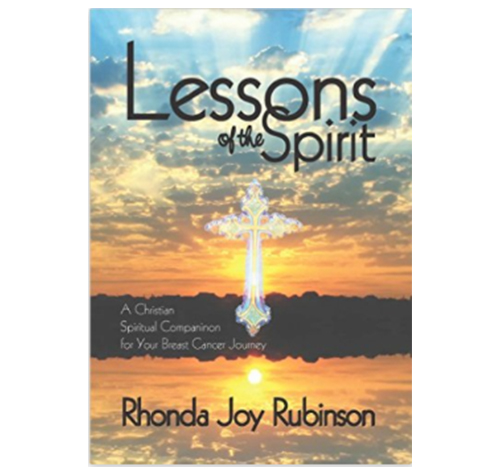Published in the Episcopal New Yorker (December 2009), with illustrations, page 12
Lessons of the Spirit: A Breast Cancer Journey
By the Rev. Rhonda J. Rubinson, interim priest, St. Philip’s Episcopal Church in Harlem
On May 8, 2008, my gynecologist put her hands on my right breast, freaked out, and sent me straight out of her office to a breast surgeon. So began my breast cancer journey; within hours I found myself in the exhausting miasma of testing and treatment that is familiar territory to all cancer patients.
Perhaps not surprisingly, I had some time to reflect during the treatment period, and I began jotting down notes on the spiritual aspects of this intensely difficult but also deeply joyful journey. What follows is an assortment of observations about the spiritual impact of breast cancer on my life, excerpts from a longer spiritual memoir about the past year. Some are meditations on the changes that have taken place in the depths of my soul, some are accounts of spiritual “coping mechanisms” I developed along the way. Like every life journey, my cancer journey is unique, but also like every journey, it has deep commonalities with those of others. Above all, it aches to be shared. While the voice in this memoir is my own, others will no doubt find resonance with their own experience.
I emphasize that these observations are deeply personal and not meant to be descriptive or proscriptive of any else’s experiences. I offer them to you in the hope that they might open a door for healing in your own soul, or the soul of someone you love.
The moment of first diagnosis is not the time to worry about repentance.
Why is God doing this to me? What did I do to bring this on myself?
In my experience as both a patient and a priest, these two questions (really two sides to the same ancient question, that of disease as punishment) are the most common questions we who have been diagnosed with cancer immediately ask ourselves. They are also by far the least productive. There are, of course, ways that we our behavior predispose us to illness. There are also factors that are out of our control which are known to raise the likelihood of developing cancer. But no matter what the cause, the question of personal guilt is one to be avoided at all costs immediately following a cancer diagnosis, as it is deeply counterproductive to healing. This moment is not the time for deep soul searching; rather, it is the time to pray for the strength to face the disease and attempt to pull one’s psyche together in order to find the right doctors and treatments. There will be time enough for soul work later on, but as the cancer journey began, I found it necessary to put it down so that my body and soul were open to the action of the Holy Spirit and medicine, not mired down in obsession on how I got into the present predicament.
Communion and chemo.
As I began my chemotherapy treatments, I began to have a real hunger for frequent communion (as opposed to a hunger for food, which of course I didn’t especially desire). The mere exercise of dragging myself to church in the morning no matter how I felt was empowering, even on the days that I could barely stay upright on the communion line. The opportunity to kneel in God’s holy presence and lay my terror and dire need directly on the altar provided an essential opportunity to “vent” to God, and I usually left feeling stronger both spiritually and physically. Perhaps most essentially, the incredible synergistic energy between the spiritual medicine of the body and blood of Christ acting in concert with physical action of the chemotherapy drugs was absolutely crucial to my passing through the barrage of treatments and surgery with strength that wasn’t my own. The Roman Catholic prayer said kneeling right before receiving the Eucharist says it all to me: “Lord, I am not worthy to receive you, but only say the word and I shall be healed.” Amen, amen.
Observe a regular Sabbath from cancer.
As a Christian of Jewish heritage, I have always had a special fondness for the Sabbath, and I’ve been in the habit of observing what I would call a “modified Sabbath” on Saturdays whenever possible – no work, no television, no computer, I just shut it down one day a week to take a break for prayer and silence in the morning, and doing things I love in the afternoon. During the cancer treatments I also made this a Sabbath from cancer – no obsessing about it, no long phone calls discussing how I was doing in agonizing detail, no returning the bombardment of emails and greeting cards that I received as a consequence of being very public about what was going on in my life. Make no mistake – I am and will always be passionately grateful for the incredible love and support that I have and still continue to receive, but I found that I needed mental and spiritual space from the strain of dealing with disease. I made the decision early on after the diagnosis that, insofar as it was possible, my life would not morph into 24/7 cancer. This disease will fill every crack in your life if given permission; if you can manage to frequently remind yourself that you are alive at this moment and have a life to live and enjoy, the whole journey becomes much smoother and folds into the rest of your life.
The wound in my soul that will never heal – and that’s a good thing.
Those who have gone through chemotherapy know that you can develop an almost hypersensitivity to what is happening in your body from the chemo drugs. I found myself mentally “scanning” how I was feeling from head to toe almost constantly, a consequence of the fact that the chemo drugs made me feel so physically weird (and so unlike the way I was used to experiencing my physical self) that I almost felt that my soul was inhabiting someone else’s body. But early on in the treatments, something else happened too – this time deep in my soul. In prayer I became conscious of a kind of wound in my soul – I don’t know how else to describe it – a place that had been cut open where there had not been a breach before. My security in my own exceptionalism at having avoided disease all my life had been blown away in the first few minutes after diagnosis, the illusion of perpetual health was gone, my mortality was now in my face, and the whole mess hurt like hell. The odd thing was that as I became conscious of this kind of bleeding in my soul – again, it is hard to articulate this – I became conscious of something else too: the healing presence of God, right beside the pain, along with the inner knowledge that both the wound in my soul and God’s constant, vital, insistent flow of new life will always be there. For me this is a profound new spiritual reality, and one that makes me deeply grateful.
Jesus couldn’t take the nails out of his own hands and climb down from the cross, and neither could I.
Everybody processes the diagnosis of cancer differently. My surgeon told me that patients frequently likened it to entering a dark tunnel that you eventually find your way through to the light on the other side, a good image for the journey as you travel through time. But in the week or so after diagnosis, the physical and spiritual shock had other manifestations: physically, I felt like I had been cast into quicksand up to my neck and was now stuck and drowning with shock and fear. The spiritual reaction was that I had suddenly becoming a participant in the Passion, hauled against my will to a cross and nailed there. Which got me to thinking: not even Jesus could take the nails out of his hands to free himself from the cross, so why should I expect that I could? After much thrashing about in prayer, when I had finally spent myself into a heap of frustration and exhaustion, I came to the realization that the best place for me to be was simply in silence before God, awaiting healing in the time and method of God’s choosing. This too is a permanent change in me. Those of you who know me know that “pushy” is pretty much my middle name. But from that moment forward, I no longer enter into prayer to push my agenda at God. Instead, I wait in silence.
Rejoice in the Lord always! Again I say, rejoice!
As tough as it is to hear, and as hard as it is sometimes to find, joy – however and wherever you can find it – is not optional for a Christian. Paul makes it abundantly clear throughout his epistles (and especially in Philippians 4), that joy is not only possible but necessary in all circumstances, because joy is power. Sometimes you have to claw and scratch for it, but it can be found, even in the midst of cancer. I can honestly say that the challenges of the last year have been thoroughly mixed with and occasionally overtaken by joy, the joy of finding the reality of God’s love in the midst of sometimes very severe fear, pain and weakness. Although it may seem out of the question in the beginning stages of treatment, it is possible to emerge from cancer treatments both healed and changed by, through, and with the love of God.
To purchase this book please contact Mtr. Rhonda directly at rev.rhondarubinson@gmail.com


